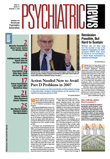Each day, people living with mental illness encounter stigma and discrimination that can prevent them from attaining life goals that others may take for granted.
While antistigma programs are often helpful in dispelling harmful myths associated with mental illness, they can worsen attitudes in some cases, according to three psychiatry residents in the APA/Bristol-Myers Squibb fellowship. The fellows, who spoke at APA's Institute on Psychiatric Services last month in New York City, discussed some of these campaigns and highlighted those that have achieved positive results.
According to Sarah Altman, M.D., a PGY-4 psychiatry resident at Cambridge Hospital in Cambridge, Mass., three of the most pervasive misconceptions about people with mental illness are that they are unpredictable and dangerous, are incompetent and can't make decisions for themselves, and lack willpower.
Such mistaken beliefs have harmful consequences for people with mental illness, who are “less likely to be hired and have apartments rented to them” than people without mental illness, she noted. They are also more likely to be rejected by family and friends, be falsely accused of a crime, and spend more time in jail than those without mental illness for the same offense.
When such misconceptions are internalized by people with mental illness, it can lead to a variety of self-defeating behaviors, she added, such as avoiding mental health treatment.
“If you know that being labeled with mental illness will get you something you don't want, you won't show up at the clinic, you won't get treatment, and you won't tell anyone about what you're experiencing,” Altman pointed out.
Some families with a mentally ill relative may experience “courtesy stigma,” meaning that they also feel a “tremendous sense of shame, blame, and hopelessness” about the mental illness and do not disclose information about it to those outside the family.
Altman cited data from a study by Christoph Lauber, M.D., in the June 2004 Journal of Community Mental Health on the attitudes of 844 people in Switzerland toward people with mental illness measured in terms of“ social distance.” The authors defined social distance as the willingness to engage in relationships of varying intimacy with a mentally ill person. The level of social distance increases if situations imply“ social closeness.”
Subjects were asked to react to a series of situations that would bring them into increasingly closer contact with a mentally ill person. Among the findings was that 27.5 percent of respondents said they would be“ definitely willing” to work with someone with mental illness, but only 4.5 percent indicated that they would be willing to let someone with mental illness care for their child.
Lauber also showed that compared with a diagnosis of depression, a diagnosis of schizophrenia tended to increase social distance in members of the community. In addition, he found that presenting people with a biomedical approach to explaining mental illness increased social distance, according to Altman.
“If people believed that mental illness was caused by a dysfunction of the brain, they actually wanted that person to stay further from them” than if they didn't hold that view, Altman noted.
Karen Hopp, a PGY-5 resident in family medicine and psychiatry at the University of California, Davis, reviewed a number of studies on how antistigma campaigns around the world affected knowledge and attitudes about people with mental illness. However, she cautioned attendees not to read too much into the findings. “There are lots of limitations to these data,” she noted, including uncontrolled trials, small controlled trials, and use of self-reported attitudes as outcome measures.
Hopp cited data from a study by Vanessa Pinfold, Ph.D., in the April 2003 British Journal of Psychiatry on the impact of two one-hour mental health awareness workshops on 472 secondary-school students in the United Kingdom.
A week after the workshops, students' mean positive attitude scores rose significantly but fell slightly after six months. Also, workshops in which students listened to people with mental illness speak about their experiences were associated with a lessening of social distance, according to Hopp.
“There was a change only in willingness to talk to someone with mental illness,” she noted.
Studies that measured the effect of mental health courses among police have found the courses to be of varying success, according to Hopp. For instance, a British study noted that after one eight-hour course, police were significantly more willing to work with someone with mental illness. Levels of knowledge about mental illness also increased.
A similar course for Boulder, Colo., police that included a presentation by an eloquent woman with schizophrenia increased officers' knowledge scores. But despite the improvement in scores, “almost 71 percent of the officers continued to hold at least one mistaken belief about schizophrenia,” Hopp pointed out.
Lauren Swager, M.D., highlighted some of the current programs designed to educate the public about mental illness and decrease certain prevailing negative attitudes. She is a PGY-4 psychiatry resident and first-year child and adolescent psychiatry fellow at the University of North Carolina at Chapel Hill.
Swager described successful antistigma programs such as “In Our Own Voice,” “Family to Family” support groups, and“ Stigmabusters” of the National Alliance on Mental Illness.
Other noteworthy programs are “Stigma Watch” by the National Mental Health Association and the Resource center to Address Discrimination and Stigma and Voice Awards of the Substance Abuse and Mental Health Services Administration.
Swager urged psychiatry training directors to discuss stigma with their trainees and called on all psychiatrists to ask their patients about experiences in which they encountered stigma.
“We must continue to include consumers in antistigma efforts,” she said. “They are the experts.” ▪
